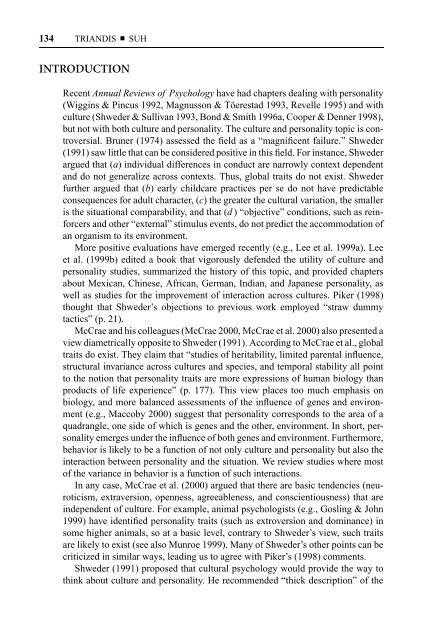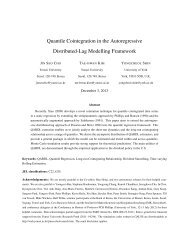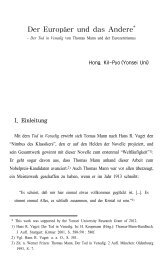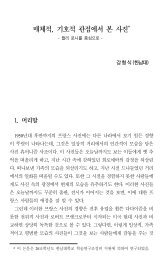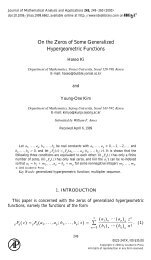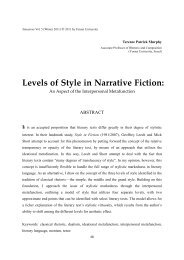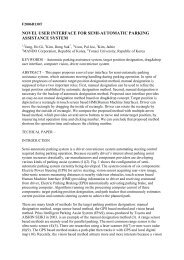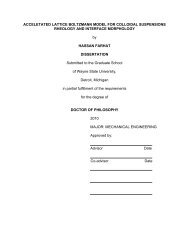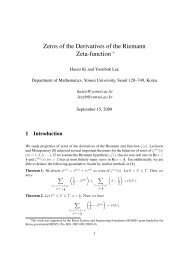CULTURAL INFLUENCES ON PERSONALITY Harry C. Triandis1 ...
CULTURAL INFLUENCES ON PERSONALITY Harry C. Triandis1 ...
CULTURAL INFLUENCES ON PERSONALITY Harry C. Triandis1 ...
You also want an ePaper? Increase the reach of your titles
YUMPU automatically turns print PDFs into web optimized ePapers that Google loves.
134 TRIANDIS SUH<br />
INTRODUCTI<strong>ON</strong><br />
Recent Annual Reviews of Psychology have had chapters dealing with personality<br />
(Wiggins & Pincus 1992, Magnusson & Töerestad 1993, Revelle 1995) and with<br />
culture (Shweder & Sullivan 1993, Bond & Smith 1996a, Cooper & Denner 1998),<br />
but not with both culture and personality. The culture and personality topic is controversial.<br />
Bruner (1974) assessed the field as a “magnificent failure.” Shweder<br />
(1991) saw little that can be considered positive in this field. For instance, Shweder<br />
argued that (a) individual differences in conduct are narrowly context dependent<br />
and do not generalize across contexts. Thus, global traits do not exist. Shweder<br />
further argued that (b) early childcare practices per se do not have predictable<br />
consequences for adult character, (c) the greater the cultural variation, the smaller<br />
is the situational comparability, and that (d ) “objective” conditions, such as reinforcers<br />
and other “external” stimulus events, do not predict the accommodation of<br />
an organism to its environment.<br />
More positive evaluations have emerged recently (e.g., Lee et al. 1999a). Lee<br />
et al. (1999b) edited a book that vigorously defended the utility of culture and<br />
personality studies, summarized the history of this topic, and provided chapters<br />
about Mexican, Chinese, African, German, Indian, and Japanese personality, as<br />
well as studies for the improvement of interaction across cultures. Piker (1998)<br />
thought that Shweder’s objections to previous work employed “straw dummy<br />
tactics” (p. 21).<br />
McCrae and his colleagues (McCrae 2000, McCrae et al. 2000) also presented a<br />
view diametrically opposite to Shweder (1991). According to McCrae et al., global<br />
traits do exist. They claim that “studies of heritability, limited parental influence,<br />
structural invariance across cultures and species, and temporal stability all point<br />
to the notion that personality traits are more expressions of human biology than<br />
products of life experience” (p. 177). This view places too much emphasis on<br />
biology, and more balanced assessments of the influence of genes and environment<br />
(e.g., Maccoby 2000) suggest that personality corresponds to the area of a<br />
quadrangle, one side of which is genes and the other, environment. In short, personality<br />
emerges under the influence of both genes and environment. Furthermore,<br />
behavior is likely to be a function of not only culture and personality but also the<br />
interaction between personality and the situation. We review studies where most<br />
of the variance in behavior is a function of such interactions.<br />
In any case, McCrae et al. (2000) argued that there are basic tendencies (neuroticism,<br />
extraversion, openness, agreeableness, and conscientiousness) that are<br />
independent of culture. For example, animal psychologists (e.g., Gosling & John<br />
1999) have identified personality traits (such as extroversion and dominance) in<br />
some higher animals, so at a basic level, contrary to Shweder’s view, such traits<br />
are likely to exist (see also Munroe 1999). Many of Shweder’s other points can be<br />
criticized in similar ways, leading us to agree with Piker’s (1998) comments.<br />
Shweder (1991) proposed that cultural psychology would provide the way to<br />
think about culture and personality. He recommended “thick description” of the


